|
|
|
Sort Order |
|
|
|
Items / Page
|
|
|
|
|
|
|
| Srl | Item |
| 1 |
ID:
186805
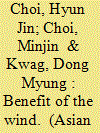

|
|
|
|
|
| Summary/Abstract |
The "rally-'round-the-flag effect" sparked by North Korea (the so-called 'Northern Wind') has been an important part of South Korean domestic politics. Despite the long history and controversy associated with politics of Northern Wind, the literature provides surprisingly little quantitative evidence on this phenomenon. In this study, we empirically investigate the relationship between North Korean-induced incidents and former President Park Geun-hye's weekly job approval ratings. Using vector autoregressions, we find that (1) President Park gained political benefits from North Korea, where negative events (e.g., armed attacks) generated a larger boost in approval than positive events (e.g., high-level talks); (2) rally effects varied across regions according to different perceptions of the North Korean regime: during security crisis, Park received the largest rallies in Gyeongnam province where the dominant image of North Korea was an 'enemy that threatens our safety'; and (3) a test of nuclear weapons or intercontinental ballistic missiles (ICBMs) did not affect approval ratings even though it captured widespread media attention.
|
|
|
|
|
|
|
|
|
|
|
|
|
|
|
|
| 2 |
ID:
191598
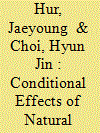

|
|
|
|
|
| Summary/Abstract |
Do natural disasters affect presidential approval ratings? In this study, we argue that in South Korea this relationship is conditional on regional partisan cleavages. Since partisanship induces perceptual biases among distinct social groups, we expect that (1) the president’s co-partisans will not blame their president even if the government fails to prevent or mitigate damage from natural disasters, and (2) human and economic losses from disasters, or delivery of disaster relief aid, may boost approval ratings in partisan strongholds. We test these hypotheses using South Korea’s Park Geun-hye and Moon Jae-in administrations. The results of vector auto-regressions show that regional partisanship toward the incumbent significantly influences job approval ratings in the wake of natural disasters. While public opinion in metropolitan areas was not affected by disaster losses, both presidents’ approval rose after disasters—typhoons and windstorms, in particular—struck their strongholds in the southeastern part of the country.
|
|
|
|
|
|
|
|
|
|
|
|
|
|
|
|
| 3 |
ID:
163195
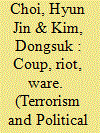

|
|
|
|
|
| Summary/Abstract |
This article explores how different types of governance systems shape different forms of political violence. We identify four governance types by combining the “institutional” dimension of coalition size represented by a minimum winning coalition (MWC) and the “ethno-political” dimension represented by the size of ethnic groups participating in the governing coalition. This study hypothesizes that (a) an exclusive system (small MWC; narrow-based ethnic coalition) is likely to engender civil war, (b) an oversized system (small MWC; broad-based ethnic coalition) is likely to generate a coup, and (c) an undersized system (large MWC; narrow-based ethnic coalition) is likely to stimulate riots or protests. Statistical analyses confirm all three hypotheses, implying that opposition groups choose alternative forms of conflict that maximize their chances of accessing power under different governance configurations. The article concludes by identifying three possible paths toward inclusive governance and suggesting that institutional reform before ethnic inclusion makes a transition toward inclusive governance far less dangerous.
|
|
|
|
|
|
|
|
|
|
|
|
|
|
|
|
| 4 |
ID:
138307
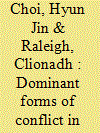

|
|
|
|
|
| Summary/Abstract |
Our article analyzes how transitioning political institutions create incentives and disincentives for opposition groups to incite different forms of political violence. We argue that variation on two specific parameters of governance—checks and balances and political participation—compels states toward one of the three forms of conflict, including civil wars, political militia, and riots. Using disaggregated data on different types of political violence across Africa from 1997 to 2012, we analyzed two parameters of governance in both count and change models. We also identified high-risk conflict periods. Typical regime types (democracy, autocracy, anocracy) cannot explain manifestations of conflict, as violence occurs in regimes with varying levels of political openness and competition. Opposition groups actively respond to regime transitions, as changes in institutional parameters correlate with shifts into alternative forms of violence within states.
|
|
|
|
|
|
|
|
|
|
|
|
|
|
|
|
| 5 |
ID:
183701
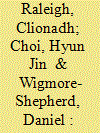

|
|
|
|
|
| Summary/Abstract |
Conflict across African states has often been linked to ethnic-based biases in government, and exclusive policies. However, the domestic politics of developing states, and the elites who contest for power therein, have often been overlooked when explaining the patterns and risk of disorder and violence. We consider how African leaders practice politics in whom to represent, and at what level. These choices have consequences as how regimes accommodate political elites creates different competitive conditions which, in turn, create incentives and opportunities for political violence. Using a dataset on cabinet appointments over twenty years, we find that high levels of elite political inclusion and mal-apportionment in positions is consistently associated with increases in non-state violence. Power distribution levels among those groups included in senior positions account for more political violence than that which stems from exclusive politics.
|
|
|
|
|
|
|
|
|
|
|
|
|
|
|
|
| 6 |
ID:
101860
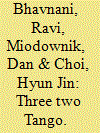

|
|
|
|
|
| Publication |
2011.
|
| Summary/Abstract |
This article extends the formal logic of Stathis Kalyvas' theory of selective violence to account for three political actors with asymmetric capabilities. In contrast to Kalyvas' theory, the authors' computer simulation suggests that (1) selective violence by the stronger actor will be concentrated in areas where weaker actors exercise control; (2) the relative level of selective violence used by weaker actors will be lower because of a reduced capacity to induce civilian collaboration; and (3) areas of parity among the three actors will exhibit low levels of selective violence perpetrated primarily by the strongest actor. Results from a logistic regression, using empirical data on Israel and two rival Palestinian factions from 2006 to 2008, are consistent with these predictions: Israel was more likely to use selective violence in areas largely controlled by Palestinian factions; zones of incomplete Israeli control were not prone to selective violence; and zones of mixed control witnessed moderate levels of selective violence, mainly by Israel. Nonetheless, Palestinian violence remained consistent with Kalyvas' predictions.
|
|
|
|
|
|
|
|
|
|
|
|
|
|
|
|
|
|
|
|
|